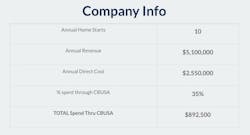A Builder Explains the Benefits of Group Purchasing Organizations
Group Purchasing Organizations (GPO) are nothing new in general, but they are somewhat so far as it relates to residential construction—a fact pointed out by longtime builder Bill Smithers during a recent episode of the podcast Residentially Speaking.
“GPOs are prevalent in pretty much every industry,” said Smithers, who apart from founding the Virginia-based custom building firm University Homes also serves as the president of CBUSA, a GPO specific to custom builders. “They were not prevalent in residential construction.”
On the podcast — hosted by Alan Hubbell, residential marketing leader for DuPont Performance Building Solutions — Smithers explained what exactly a GPO is and why he feels custom builders may benefit from joining one.
Here’s what he had to say.
Defining “GPO” and Why Residential Construction Needed One
Put generally, a GPO is an organization through which parties with shared interests (typically businesses) may partake in, as Smithers put it, “collective buying.” In the context of independent builders, a GPO may represent a chance for “independents to effectively compete with bigger, national builders when it comes to procuring (building materials and products)” — a persisting challenge, he claimed.
“Essentially,” he explained, “we bring together good business owners that can align around the shared vision of improving their position in the market. A big part of that is buying better because of the shared volume we have.”
Smithers first tested the idea locally. “We called it the co-op,” he said. Local builders, first connected through their HBA’s Custom Builder Council, started meeting regularly in hope of fine tuning their businesses. As someone who prior custom building served as a division president for a big national builder, Smithers knew pricing was rarely going to be in the little guy’s favor.
“We were all good builders. We were paying our bills on time. We thought we were being responsible customers,” he said. “And yet, we were paying a premium in the marketplace just because we were small. We really didn’t have a lot of alternatives until we started working together.”
The reason for the price gap is simply that bulk purchasing tends to be cheaper. Home Depot, for example, offers bulk purchasing discounts for more than a dozen product categories, including insulation (30% off), roofing (20% off), and drywall (up to 25% off), but you have to meet minimum purchasing requirements. The biggest builders in the nation account for tens of thousands of home starts annually, compared to some of the builders in Smithers group that “may only build one or two homes in a year,” he said. “Someone building ten to fifteen homes, it’s hard for them to build a value proposition for “building manufacturers” when it’s one on one.”
As of this year, CBUSA includes about 540 builders, 1,200 vendors, and 13 national manufacturers — ”that are partners at some level,” according to Smithers — across 33 markets. “If you looked at it relatively, we would be about the 7th biggest builder in the nation,” he claimed.
The Potential Benefits
The buying power reportedly provided through CBUSA is alone a significant financial boost, according to the GPO’s “Savings Calculator”—which assumes a buyer is “purchasing from 15 local preferred vendors,” enrollment in 5 brand partner contracts,” and “reporting through CBUSA Quarterly.”
“It’s that together mentality and the network structure that was really the foundation for CBUSA,” Smithers said, adding that the group will share best practices and compare financials. “We’ve formed a really strong community in the group.”
Things to Consider
It’s worth noting that not all GPOs are equal. Some, for instance, have the reputation of hinging their value proposition on rebates requiring spending so high that qualifying may mean purchasing more than what a builder needs. “Rebate peddlers” is what Shea Homes Vice President of Purchasing Tony Callahan wrote in a 2017 article published in Pro Builder magazine.
CBUSA does include rebates in its savings estimates, though it’s a minority portion. Also, Smithers claimed that qualifying is a matter of punctual payments.
“A key component of our business model is rebates at the local level … which depends on builders paying their bills on time,” he said. “We don’t get paid unless our builders pay their bills.”
Another complaint about GPOs is that they claim a sense of community without delivering.
“Look for a GPO that has monthly meetings,” wrote Callahan. “Regular interaction with your peers in the industry enables you to build relationships that can pay off when you’re facing tough business problems and want insight from others.”
CBUSA considers collaboration and community pillars of its value proposition to members, Smithers claimed. “Local groups meet monthly.”


